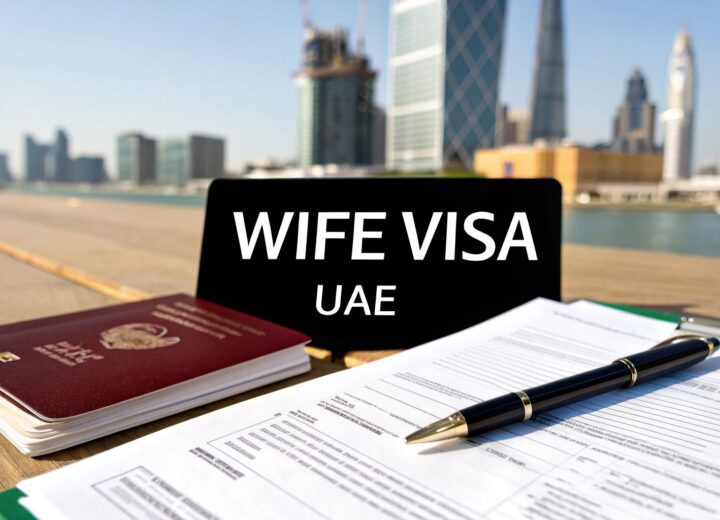Thinking about setting up shop in Dubai? One of the first, and biggest, decisions you'll make is whether to go for a mainland or a free zone company. If your goal is to tap into the entire UAE market, a mainland company formation in Dubai is really your most direct route. It's the key that unlocks the whole country, not just a specific business park.
This kind of setup allows you to trade freely with anyone, anywhere in the UAE. You can bid on lucrative government contracts and set up your office wherever you see the best fit—be it a bustling commercial district or a quiet suburban area. It offers maximum flexibility.
Unlocking the Full Potential of the UAE Market
While free zones are great for specific types of international trade, a mainland company fully integrates you into the local economy. It’s the best choice for entrepreneurs who want to sell directly to consumers and businesses right here in the UAE.
Think of it like this: a free zone licence is like having a passport for one city, but a mainland licence is a key to the entire country. You can operate without restrictions across Dubai, Abu Dhabi, Sharjah, and all the other emirates.
The Strategic Advantages of a Mainland Licence
Opting for a mainland setup isn't just about location; it comes with some powerful, practical benefits that are crucial if you're focused on growth. These advantages directly shape how far you can reach and who you can work with.
Here’s what you get:
- Unrestricted Market Access: You can trade directly with any business or consumer across the UAE. No need for a local agent or distributor to act as a middleman.
- Government Contract Eligibility: This is a big one. Mainland companies are the only ones properly positioned to bid on and win valuable contracts from government and semi-government entities.
- Geographical Flexibility: You have the freedom to rent or own an office anywhere in Dubai. This means you can be closer to your customers or in a prime commercial hub—the choice is yours.
- Unlimited Visa Potential: The number of employment visas you can get is generally tied to the size of your office space. As your team grows, you can scale up your visas accordingly.
A New Era of Foreign Ownership
Not too long ago, setting up on the mainland meant finding a local Emirati partner who would hold at least 51% of your company. For many foreign investors, this was a significant hurdle.
But things have changed dramatically. In 2021, the UAE government rolled out landmark legislation that now allows for 100% foreign ownership of mainland companies for most business activities. This was a massive shift, fundamentally changing the game for international entrepreneurs. For more details, you can explore how these changes affect business setup costs in Dubai.
Expert Insight: The move to 100% foreign ownership was a game-changer. It removed the single biggest barrier for international entrepreneurs, making mainland company formation in Dubai as attractive as many free zone options, but with the added benefit of complete market access.
Who Should Choose a Mainland Company?
A mainland setup isn't for everyone, but it’s the perfect fit for certain business models. If you plan to open a retail store, a restaurant, a law office, or an engineering consultancy, a mainland licence is not just an option—it's essential.
It’s also the best route for any business that needs a strong physical presence to build trust with local clients. Operating on the mainland shows you’re a permanent, integrated part of the UAE's economy. It’s a decision that lays the foundation for real, sustainable growth.
Deciding on Your Legal Structure and Business Activities
Before a single document gets filed, there are two fundamental decisions you have to make that will set the entire course for your mainland company formation in Dubai. First up is your legal structure, which defines everything from liability to ownership rules. The second is pinning down your business activities, which determines the kind of licence you’ll get and what you can legally do.
Getting these right from the outset isn’t just about ticking boxes on a form. It’s a strategic decision that can save you from costly restructuring and compliance headaches down the road. The legal form has to be a perfect match for your business model, and your chosen activities must be specific enough to cover everything you plan to do.
What Are the Common Legal Structures?
For most entrepreneurs looking at the Dubai mainland, the choice usually comes down to a couple of key options. Each one has different implications for ownership, liability, and even your visa eligibility, so it pays to understand what you're getting into.
The Limited Liability Company (LLC) is, by a long shot, the most popular option for foreign investors. An LLC is treated as a separate legal entity from its owners. In simple terms, this means your personal assets are shielded from business debts. It’s a highly flexible structure that works for a huge range of commercial and industrial activities.
Another common choice, especially for professionals like consultants or designers, is the Sole Establishment. As the name suggests, it's owned by one person and doesn't offer limited liability, meaning the owner is personally on the hook for all business debts. If you're an expatriate going for this professional licence, you'll need to appoint a Local Service Agent (LSA).
An LSA isn't a shareholder and holds no stake in your business. Think of them as a government liaison who handles administrative processes for an annual fee. This arrangement allows you to maintain 100% ownership and full control of your professional company.
Navigating the Maze of Business Activities
Once you've got a legal structure in mind, the next big task is picking your business activities. The Dubai Department of Economy and Tourism (DET) has a massive list with over 2,000 activities to choose from. The activities you select will be explicitly listed on your trade licence, authorising what your company can and cannot do.
Choosing the right activity is more of an art than a science. It means you need to get familiar with the official list and understand how the descriptions translate to what you actually do. For instance, a digital marketing agency might need to combine several activities, like "Marketing Management," "Social Media Marketing Services," and "Web-Design," to be fully covered.
Common Pitfalls to Avoid When Selecting Activities:
- Being too vague: An activity like "Trading" might seem broad, but it may not cover the specific goods you want to import or sell. This can cause trouble with customs or other authorities.
- Being too narrow: Choosing just one hyper-specific activity could box you in. If you want to expand or pivot later, you'll face a costly licence amendment process.
- Ignoring overlaps: Some activities can fall under different licence types (like commercial vs. professional). Getting this wrong can lead to the wrong legal structure and incorrect fees from the get-go.
Aligning Your Structure with Your Activities
The business activities you pick have a direct impact on the legal structure and licence type you'll need. The DET groups activities into three main buckets: professional, commercial, and industrial. This classification is a critical step in the mainland company formation in Dubai journey.
If your work is mainly service-based and leans on your professional skills—think consulting, design, or IT services—you'll likely get a professional licence. This usually points towards a Sole Establishment or a Civil Company structure.
On the flip side, if your business is all about buying and selling goods (trading), you'll need a commercial licence, which almost always means setting up an LLC. In the same way, manufacturing and other industrial work require an industrial licence and an LLC.
Getting this alignment wrong can bring your entire application to a screeching halt. That’s why working with specialists in mainland company formation in Dubai, Sharjah, and Abu Dhabi is so valuable. They make sure your activities, legal structure, and licence type are all perfectly in sync from day one, giving your business the solid foundation it needs to succeed.
A Realistic Breakdown of Your Setup Costs
Before diving into a mainland company formation in Dubai, it’s crucial to get a firm grip on the financial commitment involved. The process opens up incredible access to the UAE market, but you need a realistic budget from day one to avoid any surprises that could drain your capital.
Let's move past vague estimates and break down the specific government fees, third-party charges, and other necessary expenses you’ll actually encounter. A clear financial roadmap is what allows you to invest with confidence. Many entrepreneurs are surprised by just how many individual fees make up the total setup cost.
Core Government and Licensing Fees
The first stage of your setup involves several non-negotiable government fees. Think of these as the essential building blocks for your company’s legal framework, securing your business identity and the right to operate.
Your initial costs will cover things like:
- Trade Name Reservation: This secures your unique business name with the Department of Economy and Tourism (DET).
- Initial Approval Certificate: This is the DET’s preliminary green light, confirming they have no objection to your business and letting you move forward.
- MOA Attestation: If you’re setting up an LLC, your Memorandum of Association has to be drafted and legally notarised. This document is the constitution of your company.
- Trade Licence Issuance: This is the main fee for your business licence, which officially permits you to conduct your chosen activities.
These fees really form the backbone of your initial investment. For a more complete overview, you can check out our detailed guide on the cost of setting up a business in Dubai.
Mandatory Operational Expenses
Beyond the initial licence fees, you have operational costs that are mandatory for every mainland company. These are often the most significant expenses and must be factored into your budget from the get-go to ensure you stay compliant.
The big one is the requirement for physical office space. A Dubai mainland company can't operate without a registered physical address, which means you must lease an office and register the tenancy contract with the Ejari system. Costs here can vary dramatically, from a simple desk in a business centre to a full private office.
Another key expense, especially if your business is a professional sole establishment, is the Local Service Agent (LSA) fee. An LSA doesn't own any shares but acts as your official government liaison. This is an annual, recurring fee that ensures all your administrative needs are handled correctly.
A common mistake is underestimating the cost of the mandatory office lease. While flexi-desks offer a budget-friendly starting point, the annual rent can still be a significant line item that needs careful planning.
Visa and Post-Incorporation Costs
Once your trade licence is in hand, the next set of expenses kicks in, covering residency and getting your company fully operational. These costs are usually per person, so they scale with the number of partners and employees you bring on.
Here’s what to expect after your licence is issued:
- Establishment Card: This card is essential for your company to be able to apply for visas for its staff.
- Investor or Employment Visa: Every partner and employee will need a residence visa. This involves fees for the application, medical tests, and Emirates ID processing.
- Corporate Bank Account Opening: While some banks offer free account opening, others have fees or require a substantial minimum balance, which can tie up your capital.
To give you a clearer picture, I've put together a sample cost breakdown for a standard professional licence. This table illustrates both the mandatory government fees and other necessary expenses you should anticipate.
Estimated Cost Breakdown for Dubai Mainland Company Setup
| Expense Item | Estimated Cost (AED) |
|---|---|
| Trade Licence & Related Govt. Fees | 15,990 |
| Mandatory Office Lease (Annual) | 25,000 (Minimum) |
| Establishment Card | 2,000 |
| Investor Visa (1 Person) | 3,850 |
| Medical Test | 500 |
| Emirates ID | 1,070 |
| Corporate Bank Account Setup Assistance | 3,000 (Approx.) |
| Realistic Total Investment (Approx.) | AED 49,410 |
Budgeting for these items ensures a smooth transition from just having a licence to actually running your business. While a basic package might start from around AED 15,990, this comprehensive view shows that a more realistic total investment often climbs closer to AED 49,410. This way, you’re financially prepared for the entire journey ahead.
Navigating The Registration and Licensing Process
Alright, you've sorted out your legal structure and have a budget in mind. Now for the exciting part: turning your business idea into a real, legally recognised company in Dubai. This is where we get into the nitty-gritty of paperwork, approvals, and official stamps that bring your venture to life.
Think of it as a sequence of milestones. Each step, from getting your business name approved to signing your office lease, builds on the last. Paying close attention to the details here is non-negotiable—a tiny mistake on a form can cause frustrating delays. Let's walk through exactly what you need to do.
Securing Your Trade Name and Initial Approval
First things first, you need a name for your company. But this isn't just about branding; your trade name has to follow strict UAE rules. It can't be offensive, it can't already be taken, and it can't include any religious references. You'll submit your chosen names to the Department of Economy and Tourism (DET), and once one is approved, they'll reserve it for you.
With your name secured, you apply for an Initial Approval Certificate. This piece of paper is a big deal. It’s the DET's way of saying they have no objection to your business and that you can move forward with things like drafting your legal documents. Essentially, it's the preliminary green light you need to keep the process rolling.
Drafting and Notarising Your Legal Documents
Once you have that initial approval, it's time to prepare your company's foundational documents. If you're setting up a Limited Liability Company (LLC), this means drafting a Memorandum of Association (MOA). This document is the constitution of your company—it spells out who the shareholders are, their ownership stakes, what the business will do, and how it will operate.
For professional licences, which are typically structured as a Sole Establishment, you'll need a Local Service Agent (LSA) agreement instead. This appoints a UAE national to act as your go-between for government processes, but importantly, they hold zero shares in your business. Both the MOA and LSA agreements have to be drafted in English and Arabic, and then signed in front of a public notary in Dubai.
Insider Tip: Getting documents notarised is a classic bottleneck. Make sure all partners are physically in the UAE to sign, or have a legally sound Power of Attorney (POA) ready. The notary will reject your documents instantly if there are any discrepancies between the names or passport details on your application and your IDs.
The Role of a Physical Office and Ejari
Every single mainland company in Dubai needs a physical office address. This is a strict requirement; you can't use a home address or operate without a registered commercial space. You'll need to sign a tenancy contract and get it registered through Ejari, which is Dubai’s official online portal for tenancy agreements.
That registered Ejari is your proof of address and is mandatory for your final trade licence application. For many startups and smaller businesses, the most practical solution is a flexi-desk or a small serviced office in a business centre. This option ticks all the legal boxes without the heavy cost and commitment of a traditional office lease.
This infographic breaks down the core application flow, from getting your documents in order to finally receiving your licence.
As you can see, it’s a clear, sequential process. You can't start one step until the previous one is successfully completed.
Final Submission and Licence Issuance
With your approved trade name, initial approval, notarised MOA, and registered Ejari all sorted, you’re on the home stretch. You'll gather these documents, along with passport and visa copies for all shareholders, and submit the complete package to the DET.
Once they've reviewed everything and you've paid the final government fees, they will issue your trade licence. This is the official document that permits you to start operating. It will clearly show your company's name, address, and the specific business activities you're allowed to conduct. For a closer look at what this document entails, our detailed guide on obtaining a Dubai trade license covers it all.
Receiving that licence marks the successful end of your mainland company formation journey. Now, you’re officially in business.
Essential Next Steps After You Get Your License
Holding your new trade licence is a fantastic milestone in your mainland company formation in Dubai. But it’s really the starting pistol, not the finish line. To get your business fully operational, you have a few more mission-critical tasks to tick off.
These next steps are all about building your company's official identity and operational framework within the UAE. From immigration to banking, each piece is essential for staying compliant and ensuring your day-to-day activities run without a hitch.
Secure Your Establishment Card
The very first thing you need to do after getting that trade licence is apply for an Establishment Card. This small card is a massive key; it’s what officially registers your company with the General Directorate of Residency and Foreigners Affairs (GDRFA).
Simply put, without this card, your company cannot sponsor or process any visas. It’s the absolute prerequisite for bringing on partners, employees, or even getting your own investor visa sorted. The application is usually straightforward and processed quickly, so make it your top priority.
Open a Corporate Bank Account
This is often the most underestimated challenge for new businesses here. Even with your licence in hand, banks have their own rigorous due diligence and compliance checks before they’ll approve a corporate account. Honestly, this can take anywhere from a few weeks to several months.
The key to smoothing this out is preparation. Banks will want to see much more than just your trade licence.
- A Solid Business Plan: Have a clear, detailed business plan ready to present. It shows you're serious.
- Shareholder Information: Be ready with comprehensive details on all shareholders and their sources of funds.
- Proof of Business Activity: Any evidence of your operations, like early contracts or agreements, can be a huge help.
- Physical Presence: Banks strongly prefer to see a genuine office and real business operations in the UAE.
Navigating this stage takes patience and being thoroughly prepared. For a deeper dive, our guide on how to successfully open a business bank account in Dubai offers more detailed, actionable advice from our experience.
Manage the Visa Application Process
With your Establishment Card secured, you can now start the visa process for yourself, your partners, and any staff you’re hiring. It’s a multi-stage process managed through both the Ministry of Human Resources and Emiratisation (MOHRE) and the GDRFA.
The journey for each visa usually follows these steps:
- Entry Permit Issuance: This is an initial permit that allows the person to enter the UAE for employment.
- Status Change: If they're already in the UAE, their status is changed from a visit visa to a residence visa.
- Medical Fitness Test: A mandatory health screening at a government-approved medical centre is next.
- Emirates ID Biometrics: This involves capturing fingerprint and photo data for the national identity card.
- Visa Stamping: The final step where the residence visa is physically stamped into the individual’s passport.
This process ensures your team is legally registered to live and work in the UAE, building a solid foundation for your company's growth. Once you're licensed, building a strong online presence is a crucial next step, and understanding expert strategies for website development for startups will be vital.
The wider economic climate is certainly encouraging. Industry data for 2025 shows that about 91% of UAE SMEs—a huge part of the mainland business community—are optimistic, expecting their revenues to remain stable or grow. This confidence is bolstered by Dubai’s projected GDP growth of 4% in 2025 and anticipated foreign direct investment inflows of over $30 billion.
Your Top Questions About Setting Up on the Dubai Mainland
When you’re looking to form a mainland company in Dubai, a lot of questions will naturally come up. Getting straight answers is the key to making the right calls and avoiding those common, frustrating hurdles. Here, we're tackling the most frequent queries we hear from entrepreneurs setting up shop in the heart of the UAE's economy.
This isn't just generic advice; it's practical information to help you get your head around the details of the setup process, from who can own the company to how long it all takes.
Do I Still Need a Local UAE Partner for a Mainland Company?
For most people, the simple answer is no. A few years ago, the laws changed in a big way, and now 100% foreign ownership is the standard for the vast majority of commercial and industrial businesses on the Dubai mainland. This was a huge shift from the old rule that required a 51% Emirati partner.
However, it's not a blanket rule for everyone. A few strategic sectors are still exceptions, and if you're setting up a professional services business—think consultants, lawyers, or auditors—you’ll likely need a Local Service Agent (LSA). An LSA doesn't own any part of your company; they act as your official link to the government for an annual fee, handling things like visa applications and licence renewals.
It's always best to check the specific rules for your business activity directly with the Department of Economy and Tourism (DET).
Is a Physical Office Space Really Mandatory?
Yes, having a physical office is non-negotiable for a mainland company in Dubai. You must have a commercial tenancy contract registered through the Ejari system. This registration is your official proof of address for everything, from your trade licence to your bank account.
The good news is that this doesn't mean you need to immediately lease a huge, expensive office. The required size often depends on your business activity and how many employee visas you need. For many new businesses, a flexi-desk or a dedicated desk inside an approved business centre is the perfect solution. It completely satisfies the legal requirement for an address and Ejari without the high costs and long-term commitment of a traditional lease.
Key Takeaway: You absolutely need a registered physical address, but you don't have to start with a large, private office. Business centres offer flexible, compliant options that are ideal for getting your company off the ground.
How Long Does the Whole Company Formation Process Take?
Typically, you should budget anywhere from one to four weeks to get your mainland company fully set up in Dubai. What causes the variation? It really comes down to a few things: the complexity of your business, whether you need special approvals from other government ministries, and how quickly you can get all your documents in order.
The main steps that take up time are:
- Getting your trade name and initial approval.
- Notarising your Memorandum of Association (MOA).
- Finalising your office lease and getting the Ejari.
- Submitting everything for the final licence issuance.
Most delays we see are from incomplete paperwork or hold-ups waiting for external approvals for specialised activities, like healthcare or education. Working with an experienced setup consultant can help you sidestep these issues, making sure everything is correct from the start to get you launched faster.
At PRO Deskk, we make your business setup journey seamless. Why choose us?
✅ Specialists in Mainland Company Formation in Dubai, Sharjah & Abu Dhabi
✅ Specialists in Freezone Company Formation across the UAE
✅ Specialists in Golden Visa on Property and Investor Visa
✅ Specialists in Corporate PRO Services and Attestation Services
✅ 24/7 Support Service – Always here when you need us
✅ Cost-Effective Business Setup Solutions tailored to your needs
✅ Enjoy UAE Tax Benefits for International Entrepreneurs
📞 Call Us Now: +971-54-4710034
💬 WhatsApp Us Today for a Free Consultation





